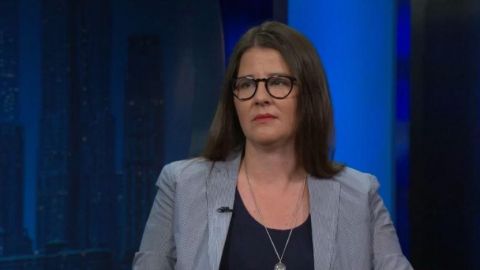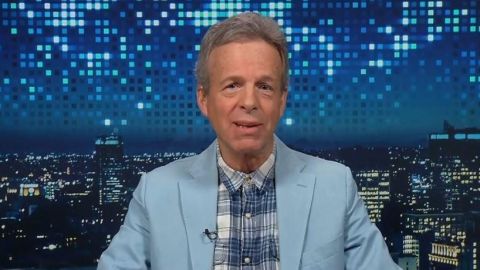Read Transcript EXPAND
CHRISTIANE AMANPOUR: It is not often a debut novel becomes an overnight bestseller but that is what happened to Kirsten Arnett. Her book “Mostly Dead Things” is a gripping exploration of family, grief, and identity as her characters come to terms with a shocking suicide. If that doesn’t grab you, it’s also set in a taxidermy shop in Florida. Arnett sat down with our Alicia Menendez to talk about how her own life has influenced her writing.
ALICIA MENENDEZ, CONTRIBUTOR: Kirsten, thanks so much for joining us.
KIRSTEN ARNETT, AUTHOR, MOSTLY DEAD THINGS: Thank you for having me.
MENENDEZ: And congratulations on “The New York Times” bestseller list.
ARNETT: Thank you very much. That was unexpected but exciting.
MENENDEZ: Exciting, yes. “Mostly Dead Things,” what is it about? How do you describe this book?
ARNETT: My elevator pitch for this book is a lesbian taxidermist takes over her family’s taxidermy shop after her father kills himself.
MENENDEZ: It was found to be a very heavy book and in many ways, it is a very heavy book that deconstructs loss and grief and desire. And it’s also really fun and funny.
ARNETT: Yes. Well, there’s this kind of dichotomy. I was having a conversation with somebody about where it’s like you experience grief like not in a silo. So when you’re experiencing grief like all these other things are going on too, which includes sometime things being funny. And then, I don’t know, I also think Florida is kind of ripe for that kind of humor, too. So hopefully people find something to laugh at in there.
MENENDEZ: I did. This is fundamentally a story about love, abandonment, grief. What experiences in your own life did you pull from, did you rely on to create those narratives?
ARNETT: Well, I specifically think I thought a lot about family dynamics. Because growing up, my family was really close and we grew up — my whole family lived in Florida. So I was thinking, too, like what are the dynamics in a family and how did they shift and change, and what things bother us when they change and whatthings like should change and don’t? So I was thinking a lot about that in my own life. Most specifically of my own life, I really brought in how I see Florida. I think very specifically the place in there is me and how I wanted readers to be able to engage with how I look around outside in Central Florida. Because I feel like Florida is such a — you’re interacting physically with the landscape. The land is always trying to creep and take itself back. The air is so heavy, it’s like pressing on your skin, it’s like a physical embrace of being here. So that stuff is definitely for my own personal experience and trying to see if I could get readers to see through the lens of how I see the state. So definitely that stuff is very much me.
MENENDEZ: Your book is so much about family dynamics. How old is that playout? What does that family look like in this book?
ARNETT: Yes. And I wanted it to be this — it’s a large family that all live near each other and I want it to be very sprawling. So I tried to dig into a family that all lives near each other and they’re in each other’s spaces all the time. So it have Jessa, my protagonist and she’s who you’re dealing with and you’re looking at things through her lens. So she — her relationship with her father who has killed himself, who ran the taxidermy shop, her relationship with her brother Milo who growing up she was very close with but as adults, they’re not estranged but don’t have this close relationship. And he has married Breen who is Jessa’s childhood sweetheart. And so there’s conflict in how the two of them interact with this love interest that they share throughout the book. And then there is also Jessa’s mother who when we’re looking at her in the past works as this kind of here’s my mother and here’s how she behaves. And in the present, she’s like behaving in strange ways while processing her own grief about her husband.
MENENDEZ: It’s all amazing ways.
ARNETT: Yes. So she’s creating a lot of pornographic kind of scenes with the taxidermy around town and in the shop. And that’s like very stressful to Jessa who sees taxidermy about a specific like kind of art that she learned from her father and so to see her mother doing this, so it’s very like strange kind of thing going on but it’s also maybe like all of them processing grief in these kind of interesting ways.
MENENDEZ: What sparked your interest in taxidermy specifically?
ARNETT: Yes. Well, growing up in Florida, there is taxidermy around all over the place, anyway. I would say it’s one of those things where it’s like I encountered it in Florida and never thought about it. like how there’s lizards everywhere in Florida and if you live in Florida, you never even think about them, it’s all over the place. The taxidermy was always around me and I knew lots of people who went hunting and kept kills and their trophies. Like in our house, we had a shellacked bath. In my church I grew up in, there were deer mounts on the wall. But I was writing this short story about a brother, a sister, a taxidermist and a goat and they screw it up really bad. Because it’s also at the same time I was looking at a lot of really bad taxidermy on the Internet just to laugh at and I got really interested in art in that kind of way. Like art that people spend a lot of time on because particularly, a taxidermy have to spend a tremendous amount of time crafting it, then and what that would mean for it to like just go — to just turn into something so bizarre or something to laugh at. So then I kind of fell down the rabbit hole of looking at what taxidermy actually entails, the process and procedures of it and just got really fascinated by all the different types there was, and also who performs taxidermy.
MENENDEZ: Right, because it’s a very gendered expression of art as you see it.
ARNETT: Extremely. Many of the people I encountered in my research online and in person was like predominantly men doing taxidermy and specific kinds of men, very kind of specifically very masculine men or men who hunt their own animals and kills and turn them into trophies. And so these men I was encountering, specifically in these chat rooms, they would be in these chat rooms talking about tips and tricks, hacks, pun intended. And the way that they would talk about it was so tender, it was almost this kind of intimacy or way that they treated it like very precious kind of art. But I was like, oh, this is allowing them to have access to art in a way that’s traditionally for these men viewed as like very feminine, they wouldn’t have access or be able to talk in this language like they’re using right now. So I just got really fascinated with it, specifically in my book as well I have a female protagonist.
MENENDEZ: Right, I was going to say. Hearing you talk about that, it would be easy to imagine the book opens, you have a father teaching his two children, his daughter and his son, about taxidermy.
ARNETT: Yes.
MENENDEZ: Later, the daughter finds her father dead in the shop, not giving a lot away.
ARNETT: No.
MENENDEZ: But she’s the one who takes over the business. Did you at any point think about having a male protagonist or did you always know that you wanted it to be a woman who is also a taxidermist?
ARNETT: I always knew that I wanted it to be a woman. I’m also very interested just as an author and as a queer woman about writing perspectives of queer women. And I’m also very interested in domestic roles for queer women and what that looks like in a household. Like what does it mean when you grew up in a very gendered household where roles are defined? So the father does these roles, the mother does these roles —
MENENDEZ: Is that the type of household you grew up in?
ARNETT: It definitely is. Yes, my family is very Evangelical/Southern Baptist. And when I was growing up, I would not have ever been allowed to do taxidermy. I wasn’t allowed to hunt. I was allowed to sew, taking sewing classes. So the stuff that my brother did was like very different from what I did. Because it was like these gendered things. Like you do this, Michael does this, my brother. And I’m always very interested, too, in kind of seeing like what does it look like when women take over those kinds of things, specifically queer women taking over things in the household? Like if there’s two women in a household, like what does that dynamic look like? When you grow up with this how normative very gendered roles? And so in writing the book, I was interested in seeing like whether this is something where she wants to pattern herself after her father, what does that look like taking on those kind of very gendered roles, like taking over the shop but then also behaving like her father? Like taking over the mantel of like patriarch of the family, like what does that look as a role for a woman, specifically?
MENENDEZ: Your protagonist, Jessa, said queer woman. You didn’t want this though to be a coming out story.
ARNETT: right.
MENENDEZ: Why?
ARNETT: As a reader — I mean growing up, but even now as a reader, I’m always looking for books where I can see queerness in the everyday. Because I think that there is definitely room for coming out narratives and they’re important, but usually it’s like a moment in time for a queer person. And sometimes I wonder who the queer narrative of the coming out story is being written for. Like is that being written for a queer audience? Sometimes no. Sometimes the way it’s being written is it’s written for a straight audience so they can kind of, like, be in the trauma, because coming out narratives are usually very traumatic. A And they’re — I don’t know, there’s just something that I’m interested in as a reader in seeing the day-to-day interests of being gay.
MENENDEZ: And rather than grappling with sexuality which Jessa is really grappling with is vulnerability.
ARNETT: Yes.
MENENDEZ: You have said softness is a scary thing.
ARNETT: Yes.
MENENDEZ: What does that mean?
ARNETT: I think — because at the same time, too, I was thinking a lot about tenderness and vulnerability and the idea of opening yourself up to that is a scary thing if you’re a person who likes to be in control of emotions and your feelings. Because also, too, if you’ve decided that you’re not going to be hurt by things, you’ll be tough, then it’s easier to deal with people. It’s not easier to deal with emotions then it just becomes avoidant. And I try to explore some of that stuff in the book with Jessa because I was like kind of took the idea of being a control freak to the extreme. What does it mean when you’re literally trying to control not only yourself but everyone around you and their lives and what they’re doing and dictating how they should feel and think? And also for me, I found that to be like — because I think things like that are absurd and very funny. So I found her — she’s not joking around a lot of the time so I found humor for myself in that character in how she is usually not seeing the joke. And I thought that was very funny, to be that kind of level of control freak where you’re like trying to tell everyone in your life how they need to behave is to me inherently funny. That’s hilarious because you can’t control people like that.
MENENDEZ: When you sold this novel, you went to celebrate at 7-Eleven.
ARNETT: Yes, I did.
MENENDEZ: You write, I think of that store and consider it my family.
ARNETT: Yes.
MENENDEZ: Why? How did it come to take that place?
ARNETT: I lived very close to my 7-Eleven. Legitimately, it’s down the block. I actually call it the Bermuda Triangle because it’s my 7-Eleven, my sub shop and then the public’s. It’s across the street so I can just be there for hours and disappear. But my 7-Eleven, I just found myself going there more and more often to get beer or snacks, but then I made friends with the people that work there and I just found myself kind of — I sort of jokingly calling it my neighborhood bar. So I hung out here a lot. It felt very comfortable to me. The smell is always the same, how things look, the people coming in and out and what’s going on. It became this very comfortable thing, and the more I found myself there, the more felt like, oh, this is what it feels like to spend time with family, right? That kind of level of comfort or what it feels like to be home.
MENENDEZ: Which you felt was missing in your own life.
ARNETT: Yes because I mean I don’t have that relationship anymore with my family.
MENENDEZ: But that’s more of a recent thing for you, right, that separation as an adult separation?
ARNETT: Yes, it is. It happened pretty close to after the election, I would say.
MENENDEZ: Can you tell me what happened?
ARNETT: I had always had struggles with my family and felt like I would behave in ways that made it so it would be easier for them to deal with things, so I would attend events and just wouldn’t talk about things that would make them unhappy or uncomfortable. And then the longer that dragged on, the more I felt myself feeling trapped or pinned into a corner, because the beliefs that my family have are wildly different than the ones that I have. And their whole thing with me has been politics shouldn’t divide it, like it’s just politics, and that’s a thing’s that they’re always kind of said and after the election I couldn’t fit in here for them anymore. And when I tried to have conversations about why it’s not just politics, it’s also my life and many other people’s lives and that’s a big deal, and they could not have conversations with me in which they would acknowledge that that was something. They couldn’t have conversations with me where they would acknowledge or engage with the fact that I am gay. And so that was like, we’re at an impasse so we can’t have a relationship until you’re willing to compromise and talk with me about why these things are problematic, and I can’t be around you if you think the way that you think and believe these things and espouse them. And so we came to this crossroads and that’s what occurred.
MENENDEZ: You’re already writing your next novel.
ARNETT: Yes.
MENENDEZ: What can you tell us?
ARNETT: I have the messy guts of it, the draft. This one is more — I would say that this book is more focused on the spirit versus the body, like less the physical and more the interior. It also more focused on relationships between partners and less focused on relationships with families.
MENENDEZ: Kristen, thank you so much.
ARNETT: Yes, thank you.
About This Episode EXPAND
Will Jawando and Mark McKinnon lay out the state of the 2020 race. Ali Vaez and Christiane Amanpour discuss whether the U.S. and Iran are set on a collision course for war. Elif Shafak joins the program to discuss her book, “10 Minutes 38 Seconds in This Strange World.” Alicia Menendez speaks to novelist Kristen Arnett about her book, “Mostly Dead Things.”
LEARN MORE



